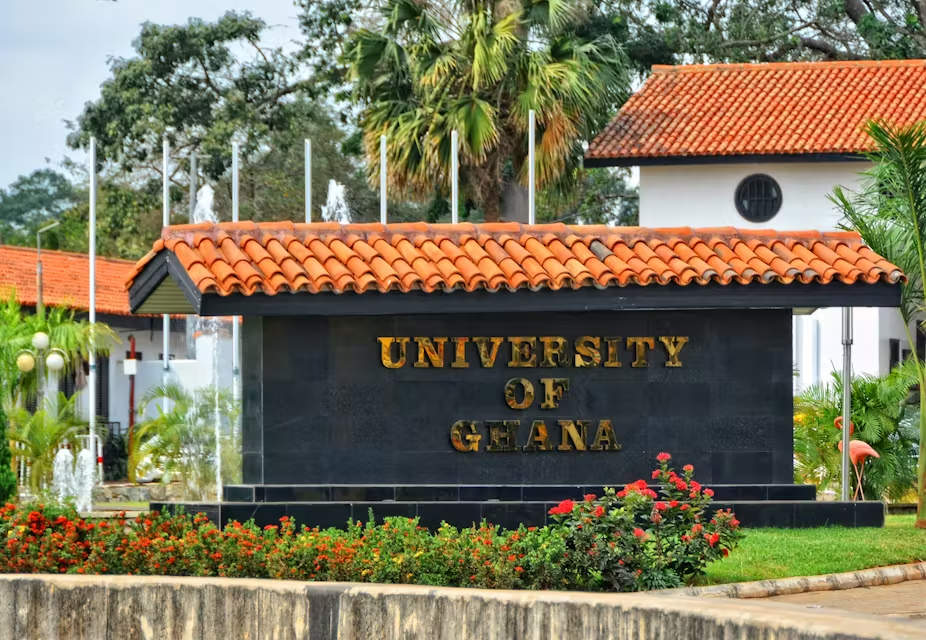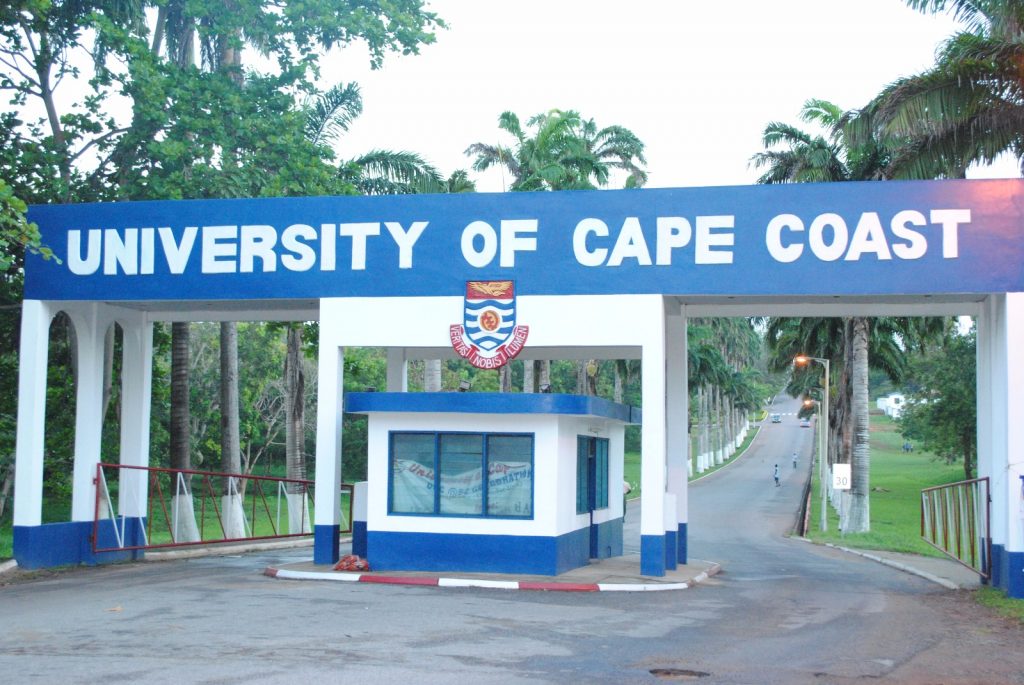University of Ghana and The University of Cape Coast (UCC) Ghana Overview – Courses Offered and Halls of Residence and Ranking
The University of Ghana, established in 1948 as the ‘University College of the Gold Coast,’ holds the distinction of being the oldest and largest among Ghana’s public universities. Originally affiliated with the University of London, the university received degree-awarding status in 1961 and has since played a vital role in the country’s academic landscape.
Collegiate System:
The university operates on a collegiate system, organized into four colleges:
- College of Basic and Applied Sciences
- College of Education
- College of Health Sciences
- College of Humanities
Each college houses research institutions and centers, including the Noguchi Memorial Institute for Medical Research, the Centre for Tropical, Clinical Pharmacology and Therapeutics, and the Regional Institute for Population Studies.
International Collaborations:
The University of Ghana has fostered partnerships with universities in North America, Europe, and Africa. These collaborations facilitate student and staff exchange programs as well as collaborative research initiatives. The university is a member of prestigious associations such as the Association of African Universities, the League of World Universities, and others.
Campus Locations:
The main campus is situated in the Legon suburb of Accra, Ghana’s capital. Additionally, the university has a teaching hospital and a secondary campus in Accra. The medical school is located in Korle Bu, southern Ghana, with a graduate school of nuclear and allied sciences based at the Ghana Atomic Energy Commission.
Historical Evolution:
- Founded in 1948 as the University College of the Gold Coast.
- Originally affiliated with the University of London, operating under its academic supervision.
- After Ghana gained independence in 1957, the college was renamed the University College of Ghana.
- Attained full university status in 1961, leading to the adoption of the name University of Ghana.

Academic Offerings:
The University of Ghana provides a diverse range of academic programs, including unique offerings in nuclear physics and nuclear engineering. With over 60,000 registered students, the institution is a major hub for education and research in the region.
Global Affiliations:
- Member of the Association of African Universities
- Part of the Norwegian Universities’ Committee for Development Research and Education
- Associated with international educational organizations like the Council for International Educational Exchange and the International Student Exchange Programmes
The University of Ghana continues to uphold its legacy as a leading institution in West Africa, contributing significantly to education, research, and international collaboration.
University of Ghana Halls of Residence:
The University of Ghana boasts a vibrant and diverse residential community through its various halls of residence. These halls provide accommodation for both graduate and undergraduate students, fostering a sense of community and camaraderie among residents. Additionally, there are government-built halls and private halls constructed on campus by individuals and corporate bodies. Below are some of the notable halls of residence:
- Commonwealth Hall:
- Known as the Vandals, representing Vivacious, Affable, Neighborly, Devoted, Altruistic, and Loyal.
- Recognized by the acronym ‘V-Mate’ and the response word ‘Sharp.’
- Identity color: Red.
- Legon Hall:
- The premier hall of the University of Ghana.
- Located at the center of the campus near the Balme Library.
- Serves as home for both male and female students.
- Motto: “Cui Multidum Datum” – “human relations with examples.”
- Mensah Sarbah Hall:
- Named after a national hero, Dr. Mensah Sarbah.
- Known for hosting many of the university’s top athletes.
- Volta Hall:
- The university’s female-only hall of residence.
- Emphasizes discipline and neatness.
- Produced notable alumnae, including the first female Chief Justice Georgina Theodora Woode.
- Akuafo Hall:
- Translates to “farmers” in Akan.
- Showcases Ghanaian culture and tradition, promoting unity.
- Annual election of a chief farmer and queen mother.
- Jubilee Hall:
- Built to commemorate the university’s Golden Jubilee celebration in 1998.
- Located on the south of the university campus.
- Funded through support funds from university alumni.
Newly Created Halls (Commissioned in 2011):
- Alexander Kwapong Hall:
- Named after Professor Alexander Kwapong, a former Vice-Chancellor and Chairman of the Council of State.
- Jean Nelson Akah Hall:
- Named after alumna Jean Nelson Akah.
- Emblem represents perseverance with a candle, a book, and a pen.
- Motto: “Lux in Tenebris” – “Light in Darkness.”
- Hilla Limann Hall:
- Part of the University of Ghana Enterprise Limited (UGEL) hostels.
- Named after Dr. Hilla Limann, a former President of Ghana.
- Senior and Junior members contribute to the governance of the hall.
- Elizabeth Sey Hall:
- Named after the first female graduate of the university, Elizabeth Frances Baaba Sey.
- Africa Union Hall:
- Formerly called Pentagon, built by Social Security and National Insurance Trust (SSNIT).
- James Topp Nelson Yankah Hall:
- Formerly known as Teachers Fund (TF) Hostel.
- Bani Hall:
- Initially a private hostel and later converted to a hall.
- Evandy Hall:
- Formerly Evandy Hostel, converted to a hall after the tenancy agreement with the university.
The halls of residence contribute to the rich tapestry of student life at the University of Ghana, providing not only accommodation but also fostering a sense of identity and belonging among students.
The Balme Library, located on the main campus of the University of Ghana, was established in 1948 under the name Achimota College Library. Serving as the central hub of the university’s extensive library network, it stands as a cornerstone of academic resources.
College of Health Sciences:
This college comprises six schools and one research institute, each specializing in various aspects of health education and research:
- School of Medicine and Dentistry
- School of Biomedical and Allied Health Sciences
- School of Nursing (situated on the Legon campus with practical training at the Korle-Bu Teaching Hospital)
- School of Pharmacy
- School of Public Health
- School of Education and Leadership
- Noguchi Memorial Institute for Medical Research
- Centre for Tropical, Clinical Pharmacology & Therapeutics
College of Basic and Applied Sciences:
Comprising five schools, six research-based centers, and two institutes, this college focuses on diverse academic disciplines:
- School of Physical and Mathematical Sciences
- School of Biological Sciences
- School of Agriculture
- School of Engineering Sciences
- School of Veterinary Medicine
- Livestock and Poultry Research Centre (LIPREC)
- Soil and Irrigation Research Centre (SIREC)
- Forest and Horticultural Research Centre (FOHCREC)
- Biotechnology Centre
- West African Centre for Crop Improvement (WACCI)
- West African Centre for Cell Biology and Infectious Pathogens (WACCBIP)
- Institute of Environment and Sanitation Studies
- Institute of Applied Sciences and Technology
Collegiate System:
Since the 2014/2015 academic year, the University of Ghana has embraced the collegiate system. All schools and departments are categorized under four colleges:
- College of Basic and Applied Sciences
- College of Humanities
- College of Education
- College of Health Sciences
Other Faculties:
Apart from the colleges mentioned above, there are five additional faculties:
- Faculty of Arts
- Faculty of Social Studies
- Faculty of Science
- Faculty of Law: Initially a department within the Faculty of Social Studies, it became a full-fledged faculty in the 1960/61 academic year. Starting from the 2012/2013 academic year, the faculty admits fresh Senior High School (S.H.S) students into the LLB first-degree program while retaining the post-first degree program, offering two entry means.
- Faculty of Engineering Sciences
The University of Cape Coast (UCC) Ghana
The University of Cape Coast (UCC), a public collegiate institution located in the historic town of Cape Coast in Ghana’s central region, operates on two campuses: the Southern Campus (Old Site) and the Northern Campus (New Site). Notably, the campus boasts a unique seafront view and is situated on a hill overlooking the Atlantic Ocean. This university was established in October 1962 to address the critical need for highly qualified educators in Ghana’s education sector.
Initially founded as a university college, UCC’s primary focus was to train graduate teachers for second-cycle institutions, teacher training colleges, and technical institutions. In response to its success and growing capabilities, it attained full university status on October 1, 1971, through an Act of Parliament. Today, the university has expanded its scope to include the training of professionals in various fields such as medicine, business, law, and agriculture.

College of Agriculture & Natural Sciences:
- School of Physical Sciences
- School of Biological Sciences
- School of Agriculture
College of Distance Education:
- Department of Business Studies
- Department of Education
- Department of Mathematics and Science
College of Education Studies:
- Faculty of Educational Foundations
- Faculty of Humanities & Social Sciences Education
- Faculty of Science & Technology Education
- School of Educational Development & Outreach
College of Humanities and Legal Studies:
- Faculty of Social Sciences
- Faculty of Arts
- Faculty of Law
- School of Business
College of Health & Allied Sciences:
- School of Medical Sciences
- School of Nursing & Midwifery
- School of Allied Health Sciences
School of Graduate Studies and Research:
The School of Graduate Studies (SGS) oversees and coordinates graduate-level academic programs for all colleges within the university. It is responsible for drafting regulations, receiving reports and recommendations, determining results, and making recommendations for the award of higher degrees and graduate diplomas.
UCC operates on a two-semester system for regular graduate programs, offering degrees such as Master of Arts (M.A.), Master of Science (MSc), Master of Education (MEd), Master of Business Administration (M.B.A.), Master of Philosophy (M.Phil.), Master of Commerce (M.Com.), and Doctor of Philosophy (PhD) in various disciplines. The duration and structure of these programs vary, including coursework, projects, and research components.
Yearly Tuition Fees Range Matrix
The University of Cape Coast’s Tuition Fees Range Matrix is categorized into two types of students (local and international) and two degree levels (undergraduate and postgraduate). This matrix provides an approximate idea of the yearly tuition range for students at the University of Cape Coast.
University of Cape Coast: Tuition Fees Range Matrix
| Students | Undergraduate | Postgraduate |
|---|---|---|
| Local Students | New Students GH¢3,600.00; Continuing Students – GH¢3,300.00 | – |
| International Students | $5,000 – $7,499 US (€4,555 – €6,830 Euro) | $5,000 – $7,499 US (€4,555 – €6,830 Euro) |
University of Cape Coast’s Gender Admission Policy
This institution follows a coed (Men and Women) admission policy.
University of Cape Coast’s Admission Selection
The university has a selective admission policy based on students’ past academic records and grades.
International Students Admission
International students are encouraged to apply for admission at this institution.
University of Cape Coast’s Admission Office
Admissions Section, Directorate of Academic Affairs, University of Cape Coast, Cape Coast
Phone: (42) 35987
